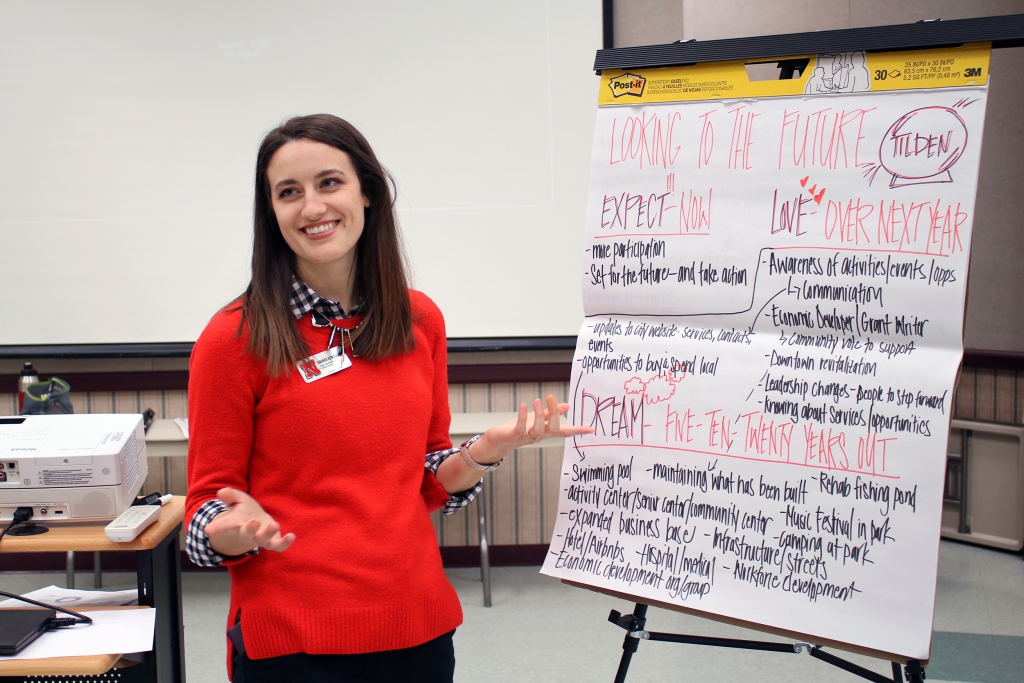Russell Shaffer, February 9, 2022
Kowalewski focuses on building strong, resilient communities
At the Tilden Public Library, Nebraska Extension Educator Amanda Kowalewski welcomes residents to the first discussion of the Entrepreneurial Community Activation Process program. When meeting with community members for the first time, she often asks about their hopes, dreams and challenges for their community.
“I really want to know their perspective,” Kowalewski said.
As a Rural Prosperity Nebraska extension educator, she knows it’s not her job to fix communities, but to learn how to help locals where they most want help.
This view is emphasized by Kyle Petersen, an attorney in Tilden who attended the ECAP meeting.
“For small towns, our growth is reliant on community members,” he said. “It’s nice to get everyone to figure out what’s the most important thing that the community needs to do and then try to rally folks behind that.”
Stationed in Pierce, Kowalewski helps rural towns in northeast Nebraska come together to create and complete community-driven improvement projects. A native of Gothenburg, she has an affinity for rural towns — so much so that while earning her Master of Science in agriculture economics at the University of Nebraska–Lincoln, she focused her thesis on the well-being of rural communities.
“I looked at why certain communities in Nebraska seemed to be growing and really positive about what their future looked like,” she said, “whereas others had negative attitudes and perceptions about their future.”
Whether researching opinion-based questions through the 2020 Rural Poll or collecting demographic and socioeconomic data from the U.S. Census, Kowalewski boiled her conclusion down to one word — resilience.
“Communities that are positive are more resilient,” she said. “They have higher levels of social capital and offer more quality-of-life amenities.”
Amenities are pretty straight-forward — parks, restaurants, community activities and such. Social capital, on the other hand, consists of the community elements that connect people and create relationships. That was the caveat in Kowalewski’s research.
“Measuring things like resiliency and social capital is really difficult and messy,” she said, knowing that communities aren’t made up of numbers on a page, but real people with real lives. “There’s a lot more that goes into what makes up a community — the people in a community — and everything that goes along with well-being.”
For example, resilience. Google defines it as “the capacity to recover quickly from difficulties.” But Kowalewski didn’t only focus on recovery from natural disasters, even though the region she works in suffered from floods in 2019. She looked at how communities bounced back after a leader stepped down, when local leadership transferred between individuals, or when a key business left town.
“What does it look like coming back from that, bouncing back from that, being able to continue to build and grow in a sustainable way?” she said.
Only a holistic view of communities can answer those questions, she said. This is where her research, which she said was mostly theoretical while in school, is finding day-to-day application in her career.
“There’s a lot more to building a really positive community, or a really quality community, than just one thing,” Kowalewski said. “It’s not just social capital or having amenities or having quality housing. It’s taking a really balanced approach, asking, ‘What goes into building a place where people want to live?’”
Answering these questions in conversation with community members is where Kowalewski’s research underlies her work.
Molly Navratil, a Tilden City Council member who attended the ECAP meeting, voiced aspirations for the community.
“I hope that Tilden keeps its strong, awesome, positive identity, but is able to grow on the things that it needs to leap into the future,” Navratil said. “I hope that we’re able to do it together as a community and be able to move forward in the right direction.”
As Kowalewski wraps up conversations with community members, she often asks them to describe their community in one word. Coming from, studying, working in, creating relationships with and once again living in a rural town, she believes that one word is what makes Nebraska feel like home — connection.
Entrepreneurship Food Security Rural Issues Rural Prosperity Nebraska






